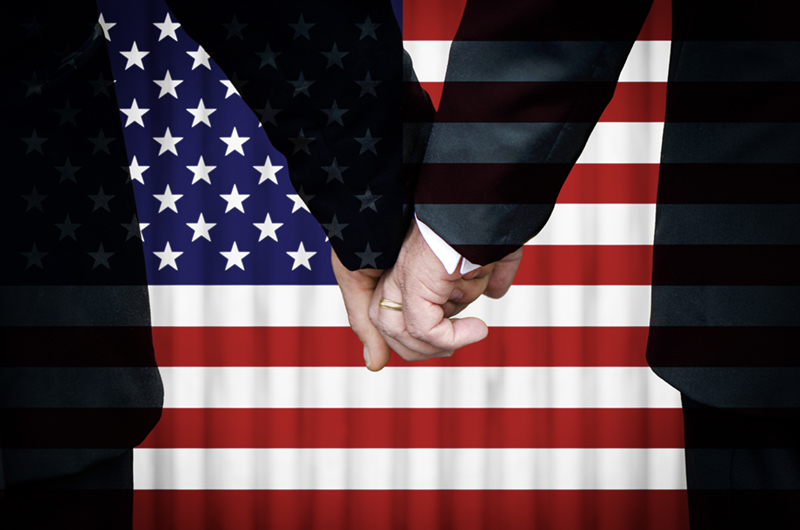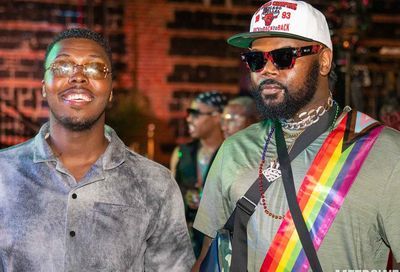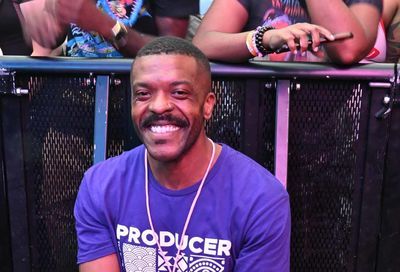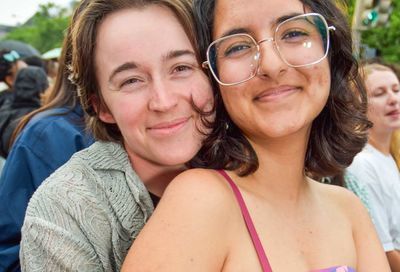Leading the Charge
HRC head Cheryl Jacques talks about defeating anti-gay Federal Marriage Amendment and electing John Kerry
Cheryl Jacques had a tough act to follow when she arrived in D.C. last January to take the helm of the Human Rights Campaign. The nation’s largest gay and lesbian civil rights organization had just moved into its new building under the leadership of Elizabeth Birch, who had presided over nine years of rapid growth, both in size and influence.
“I have the incredible good fortune of being able to step up onto the shoulders of a giant,” says Jacques, freshly returned from a round of lobbying and testifying on Capitol Hill against the Federal Marriage Amendment. “Elizabeth Birch built this incredible organization and gave it the power and the clout it has to get things done. And I get to help it soar to new heights.”
It’s certainly the time when those new heights need to be reached. The 42-year-old former Massachusetts state senator and district attorney came to HRC at the time when everything seemed to be happening at once: sodomy rulings from the Supreme Court, legalized marriages around the corner in Massachusetts, and a presidential commitment to amending the Constitution to forever ban marriage for GLBT Americans.
Although she’s established a homestead in Silver Spring with her partner, Jenn Chrisler, and their tow-headed twin two-year-olds Timmy and Tommy, Jacques — pronounced “Jakes” — still considers Massachusetts her home state, and the family splits its time between the two locations.
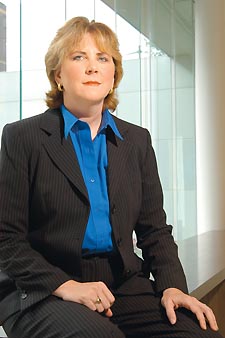 Cheryl Jacques |
In between juggling conference call scheduling, imminent flight departures, and a check-in with the HRC Marriage War Room, Jacques outlined her vision for the civil rights group’s goal of defeating the marriage amendment and the president who supports it.
METRO WEEKLY: We’ve seen initial waves of GLBT couples taking part in the historic moments of marriage. But as marriage becomes more of an integral part of society, do you think most gay and lesbian couples will opt to get married?
CHERYL JACQUES: A poll of our community that HRC did a few months ago reflected that over eighty percent of our community does want the right to get married. It’s no surprise that the overwhelming majority of our community wants the same rights as other Americans. Over time, I think that this will play out the same way it plays out with any American, straight or gay. Some people want to get married, some folks want to wait and see. There is no right or wrong answer. How wonderful that we will get to a point in this country — and I do believe we will get there — where GLBT folks can make that decision like any other couple who is in love.
MW: Are you planning on getting married in Massachusetts?
JACQUES: I’ll give you the same answer I give everybody: Jenn and I feel very privileged that we can have that personal conversation. My goal as head of the Human Rights Campaign is that every gay American in this country can have the exact same conversation. It’s their choice whether or not they want to get married. We feel very honored that we can in fact have that conversation.
MW: So no engagement to announce or anything like that?
JACQUES: We’re having that very personal conversation.
MW: The Washington Post recently ran an article in which anti-gay religious conservatives expressed some concern that the marriage issue wasn’t giving them the kind of political traction they expected. Do you think that’s the case, based on what we’ve seen in Massachusetts?
JACQUES: I’m actually not at all surprised by that. Frankly, the only thing I’m probably surprised by is how quickly I think the country is going to get comfortable with marriage in Massachusetts and marriage in general for the gay community. It’s going to move very quickly, and I think Massachusetts is evidence of that. Certainly in the state of Massachusetts it is no big deal. The sky hasn’t fallen, the sun has come up, life has gone on. Most folks are fundamentally fair-minded and good-hearted and they don’t begrudge people happiness. They see two loving, committed people who want to be married, they see them raising children more often than not, and they say, “Well, good for them.” We also saw that in San Francisco with straight folks showing up to applaud gay couples getting married. The learning curve is going to happen very quickly, and the country is going to see that this isn’t something to be afraid of.
MW: Even if that learning curve happens quickly, how long do you think it will be to turn back the state-level DOMAs and constitutional amendments that have passed in so many states?
JACQUES: That’s a longer battle. We will move quickly in the court of public opinion. Almost half the country supports civil unions and the concept of legal recognition and protection for our families. That was not the case just a few years ago when Vermont passed civil unions. So the country is growing and moving quickly. In legislatures and courts things are moving slower, and although we’ve had the most progress in courts, they move slowly by their very nature. And we’re having slow progress in changing the infrastructure in the state and federal governments.
We’re in a very unique moment in time where public opinion is shifting faster than the elected officials who normally help drive public opinion. I think they will catch up, though. Elected officials who cast votes for the Federal Marriage Amendment are going to find themselves on the wrong side of history very quickly. They’re going to be regretting that vote and distancing themselves from it for the rest of their careers. Right now the vote may feel safe because the country is opposed to gay marriage, but the numbers are turning very quickly. I make this argument to a lot of elected officials: the next voting block coming up — today’s young people — is overwhelmingly in support of equal treatment for GLBT folks in the workplace and the community. Elected officials will be explaining that vote for many years to come, not just this one moment in time.
MW: Did hate crimes legislation pass the Senate recently in part to provide political cover for members who want to vote for the FMA but have something on their record that provided some level of “tolerance.”
JACQUES: As the head of the nation’s largest gay rights organization I would have and will disabuse any elected official of the notion that there is some way to mitigate writing discrimination into the Constitution or to inoculate yourself from the worst vote of our lifetime. We’ve been very clear that we have drawn a line in the sand when it comes to the question of the FMA: Anyone who votes for the FMA is no friend of the gay community, and will not be supported by the gay community. There may be other issues where we can say, “You win some, you lose some,” but not this one. There is no equivocating on writing discrimination into our most precious document.
MW: Has the strategy of FMA proponents to push through with votes on it during this election cycle caused an even higher level of concern?
JACQUES: [The Senate vote] is scheduled for the week of July 12. HRC has been hoping for the best and preparing for the worst when it comes to the Federal Marriage Amendment. When the President had his press conference earlier this year announcing that he would use the powers of his office to help pass this constitutional amendment, I put together a marriage team, which literally is a marriage war room. It’s run by one of the best in the business, [former Recording Industry Association of America (RIAA) head] Hilary Rosen, who’s just a superstar strategist, lobbyist and team builder. That team has been working seven days a week, twenty-four hours a day to build a proactive strategy, react rapidly to new developments, and get ready to defeat this vote in the U.S. Senate. And we are ready for it. We will defeat this vote. We are not overconfident, but we are confident that our hard work and what we have put in place is going to hold and that we are going to defeat this vote.
MW: Given that the mechanisms of the constitutional amendment process are stacked against any amendment passing, what would have to happen for the Federal Marriage Amendment to pass?
JACQUES: Our forefathers did set the hurdles high to change the United States Constitution and God bless them. They didn’t want this precious document used in a knee-jerk manner. Having said that, I think it is a complete mistake to underestimate that this could ever happen. I have heard some folks say, “Oh, this can’t happen, the hurdle’s too high.” That is completely the wrong attitude. If we did nothing it could pass the Senate. If we did nothing it could pass the House. If it passed the House and Senate and went to the states, it would take thirty-eight states to ratify the constitutional amendment. Thirty-nine states have passed defense of marriage acts. I believe if it ever got out of the congress, the potential for it to spread like wildfire would be there. So many states are pushing ballot initiatives, the appetite is there to support these kinds of measures. I’m really grateful that we took it very seriously. Our goal is nipping it in the bud.
MW: In your efforts, you’ve used the words of people like Bob Barr, who introduced the federal Defense of Marriage Act, but oppose the FMA because they oppose altering the Constitution. Does that kind of alliance cause any problems for you when working with some of the more liberal elements of your support base? Barr and a number of other conservative FMA opponents are not well-loved by a lot of people in the gay community.
JACQUES: Nor should they be, given their record.
MW: So is it political necessity or political hypocrisy to pull those people into your efforts?
JACQUES: I’ve been really proud of our community in understanding that we are under the threat of a lifetime. If the Constitution is changed, then every arena where we’re making progress — from the courts to corporate America — is shut down. I believe our community really gets it and their attitude, like HRC’s, is win at all costs. Win however you can win. And if that means having Bob Barr speak to a conservative member of Congress and say true conservatives are conservative with the Constitution, and that gets that member to vote against the FMA, then that’s a home run. That doesn’t mean for a second that we are lauding Bob Barr. He is no hero of the gay community. But under the definition of politics makes strange bedfellows, this is a classic example. I am more than happy to have a Bob Barr talking to other conservatives in order to secure their vote against discrimination in the Constitution.
MW: With the rapid victories and changes in the past year, from sodomy to marriage rights, how much has HRC’s focus changed? Has the FMA fight taken significant resources from other fights?
JACQUES: It’s a balanced approach. We do think that stopping the constitutional amendment is the most important priority short term. But it’s part of a multi-pronged fight: stopping the FMA; working with state groups to stop the attack on state constitutions in battleground states such as Ohio, Missouri and Pennsylvania; and working to elect and protect fair-minded leaders at all levels of government. And we’re working to elect a fair-minded president, and that person is John Kerry, who the Human Rights Campaign has endorsed.
MW: Have you seen a fundraising increase as a result of FMA?
JACQUES: We’ve seen the community really step up — and our straight allies as well — to this very dangerous moment in time and be willing to put their money where their mouth is. And also there’s time. Some people can’t write checks but they’re giving extraordinary amounts of time, whether it’s helping out as a volunteer, lobbying the Hill or staffing a pride booth. And we’re as grateful for time as we are for money.
Having said that, I don’t think people understand the dynamics of the financial fight. Pro-GLBT groups are outspent about five-to-one by the anti-GLBT forces. Last year the anti-GLBT forces spent about 250 million dollars telling America we’re bad people, we don’t deserve to be in committed relationships, we don’t deserve to have children, we don’t deserve to be in the classroom. The pro-GLBT forces spent about fifty million dollars, and HRC accounts for about half of that so we’re clearly the strongest and loudest voice in the room. We take that responsibility very seriously, but all of us are being outspent five-to-one. So when it comes to money I can see we’re not going to out-raise the other side. But that’s okay, because we’re not going to win this on money, we’re going to win it on merit. But we do need enough money to be in the ring. It’s a David and Goliath fight. And the community has been very generous and understanding.
MW: Given how close the last election was and how we seem to think that this next election is also probably going to be very close…
JACQUES: Nobody can ever say again that their vote doesn’t count.
MW: If you’re looking at two energized political bases, and the idea is that you have to target and attract those middle-ground voters to your side to gain a majority, what are the basic ways you’re trying to target them?
JACQUES: HRC is putting more resources and time into this area than ever before. We’re using the state of the art techniques, polling, focus groups, door-to-door canvassing, to identify over three hundred thousand new GLBT voters, and to bring 1.5 million GLBT voters and their allies to the polls in November. This election could turn on a few hundred thousand votes, so we’re going to make sure that the GLBT community and their progressive allies are out in force and hope that that can make the difference. We’re confident that it can.
MW: What are the main reasons that HRC has decided to endorse John Kerry?
JACQUES: First of all, John Kerry is the strongest person nominated for president that our community has ever had the opportunity to endorse — he’s got the best record ever. He has not just talked the talk of equality and fairness for all, but he’s walked the walk for over twenty years. As a freshman U.S. senator he filed an equal rights bill for the gay community, and that was the mid-eighties when arguably it was a lot harder to be for gay rights than it is today.
He testified before the Senate Armed Services committee against “Don’t Ask, Don’t Tell,” and gave eloquent testimony about gay and lesbian men and women serving heroically and patriotically for their country. That’s a president who would have the credibility to talk to the American people and say “Don’t Ask, Don’t Tell” has failed and we need our GLBT men and women in uniform to be allowed to serve. He was one of a handful of senators who voted against the 1996 Defense of Marriage Act. He’s strongly opposed to the Federal Marriage Amendment. That’s a man who should be the next president of this country.
He will be a president who has an open mind, an open heart, an open door. And we’ll be able to talk to him. For example, I wish he supported gay marriage. He doesn’t. But you can sit and have the conversation with John Kerry. When he was saying that he supported civil unions as opposed to marriage rights, he didn’t understand that civil unions don’t trigger any of the over 1,000 federal benefits and protections that marriage triggers. When it was explained to him and his staff by HRC, he said that he would support a federal bill that puts in place the 1,000 plus benefits and protections. So he keeps trying to get gay couples equal treatment under the law, and that’s an extraordinary difference from the current officeholder.
MW: Isn’t that sort of legalistic, backdoor support for gay marriage if you support giving all the rights but not giving the name? Is the general feeling at HRC that Kerry supports gay marriage but won’t says so because it would hurt him in the election?
JACQUES: I won’t speak for him because I actually don’t know. I know what I’ve heard him say. I’m disappointed that he doesn’t support gay marriage. I’m disappointed that he came out for the Massachusetts compromise amendment for civil unions, and we’ve said that very publicly. I continue to want to work with someone we can educate and enlighten on our issues. It’s important to note that John Kerry is where most of America is. He is struggling to understand gay marriage. He doesn’t want to discriminate. That’s where most of the country is. Frankly, that’s where most of our allies are. But those are all people we can work with and continue to talk to and educate. I think they’ll get there, as I believe John Kerry will.
|
MW: You came out around the time of the 2000 Millennium March, right?
JACQUES: HRC was the catalyst — they were the match that lit the fuse that set off the confidence in me to do all that.
MW: You would have been around 37 or 38-years-old at the time. Do you feel that you’ve missed anything that would have been relevant or important for this job in terms of living an openly gay life? Have you been at a disadvantage because of those experiences you might not have had because you came out much later in life than a lot of people?
JACQUES: No, I don’t think it’s impacted my job or my role here. Personally, I’m sad that I missed good years of my life when I wished I had been open — that I had the life I have now rather than the life I had then. On a personal front, I’m sad about the timetable, but on a professional front no, I don’t think it has impacted one way or other. In fact, I think it actually helps me understand an important principle — that coming out is a personal journey and we have to respect everybody’s journey and how they get there. And I see HRC’s role as being the welcoming hand that greets them and helps them get there by offering them the tools, the support and the structure they need to join this incredible community.
MW: What was the biggest thing that kept you in the closet?
JACQUES: Fear. I greatly, greatly underestimated the goodness of people. I’m saddened by the people who go their entire lives never finding out what I found out — that by and large people are very fair-minded and good-hearted and we shouldn’t underestimate that. That’s why I’m so optimistic about the future and how this next chapter in the book of civil rights will turn out. That’s why I think people like George Bush have completely played their hand wrong, because they are appealing to the worst in people. There’s so much good in people, and they’re underestimating that.
For more information about the programs, projects and policies of the Human Rights Campaign visit www.hrc.org.
Support Metro Weekly’s Journalism
These are challenging times for news organizations. And yet it’s crucial we stay active and provide vital resources and information to both our local readers and the world. So won’t you please take a moment and consider supporting Metro Weekly with a membership? For as little as $5 a month, you can help ensure Metro Weekly magazine and MetroWeekly.com remain free, viable resources as we provide the best, most diverse, culturally-resonant LGBTQ coverage in both the D.C. region and around the world. Memberships come with exclusive perks and discounts, your own personal digital delivery of each week’s magazine (and an archive), access to our Member's Lounge when it launches this fall, and exclusive members-only items like Metro Weekly Membership Mugs and Tote Bags! Check out all our membership levels here and please join us today!








